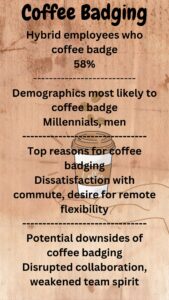New Delhi: Employees are brewing a new perk in the hybrid work landscape: “coffee badging.” A report by Owl Labs reveals 58% of hybrid workers admit to this sly tactic, briefly swiping into the office for a caffeine fix and quick social interaction before retreating back to the comfort of home. Is this “presenteeism lite” a harmless perk or a productivity poacher?
Owl Labs Sounds the Alarm: The study, titled “State of Hybrid Work 2023,” paints a picture of a workforce divided over mandatory office days. Coffee badging emerges as a subtle resistance, with millennials and men leading the charge. While employees cite dissatisfaction with commute times and a desire for remote flexibility, concerns arise about collaboration and team cohesion.

“Face Time Lite” Debate Heats Up: Proponents of coffee badging argue it’s not about shirking work, but reclaiming control over their environment. “Presence shouldn’t define productivity,” says Sarah, a coffee badger and software developer. Critics, like marketing manager John, counter that fleeting appearances undermine team spirit and stifle the “creative spark” of in-person interaction.
Beyond the Buzz: Brewing Solutions: Coffee badging isn’t just a caffeine kick, it’s a call for organizations to re-evaluate hybrid work policies. Open communication, addressing employee concerns, and embracing flexible models are key ingredients for a successful blend. Fostering a vibrant office culture that incentivizes collaboration can lure employees back for more than just a latte break.
Will coffee badging fade into a temporary fad, or is it a sign of a brewing shift in workplace expectations? One thing’s for sure, employers need to adapt their brew to keep their workforce engaged and productive, even if it means accepting shorter visits with a bigger caffeine boost.
Follow us on Facebook, X, YouTube & Instagram to never miss an update from The Credible India

